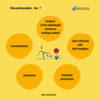#favouritemodel No. 7 - Motivation

Not at all! One could simply answer if one starts from a systemic perspective - as we do in counselling. But this text is not meant to be about powerlessness, but to help meet the complex challenges that arise from the fact that in leadership we are always dealing with other individuals who we cannot control operationally.
But from the beginning: why do I not believe that people can be motivated? Maybe it's a bit of a quibble, but I am convinced that you can de-motivate people very immediately through your own actions, but not motivate them in the sense of a cause-effect correlation - along the lines of: I do this and then he/she does that. (This is what one would call manipulation, by the way).
This concept of motivation takes much more account of the complexity of interaction with other living systems and that, as a living system, each person is responsible for his or her own actions.
This ties in very closely with the idea that I, as a leader, am the one who creates the framework for and with my team in which they should and can perform. (#favouritemodel No.1) For the motivation of the individual, we use the image of the leader as a gardener and motivation as a plant that one wants to make flourish.
What is the meaning behind this metaphor?
In order to have beautiful plants that thrive well and survive the next heavy rain, I need to get to know the plant. I have to inform myself, what conditions does it need? What environment, how much sun, how much shade and water, what soil helps to form larger flowers, etc. Let's just imagine that the gardener would transfer what is good for him personally 1:1 to every plant in the garden - or pull on the plant to make it grow faster. Absurd idea? That's exactly what we often do when we want to motivate others! We assume that what motivates ourselves will also motivate others. But motivation is an emotional state and therefore always subjective. Although there are common factors that generally influence all people positively - such as perceived self-efficacy, freedom to act, a sense of achievement, belief in the goal and a shared higher purpose - these factors are perceived very individually. What drives one person tends to leave another cold or perplexed. The great thing is: we can learn a lot about our "plants" by asking our employees what is important to them.
I particularly like this model because it poses the question in a fresh way: who is actually responsible for motivation in the team?
I have often witnessed how much managers rack their brains and really try hard to find the best motivating factors for their employees. With the metaphor presented, it becomes clear: I as a leader am responsible for shaping the environment. To do this, I can and should go into conversation with my team to find out which conditions are experienced as conducive, which as obstructive. But I can only indirectly influence with how much energy, effort and perseverance the employees tackle their tasks and thus cannot take responsibility for this motivation. Many leaders find this idea very relieving.
How does my #favouritemodel help you?
You have the feeling that you are "at the end of your wits"? Have you "tried everything" to motivate your employees? The simple answer: if everything you do doesn't help, then stop!
Get in touch with your staff and your team! Ask: "What do you need individually?", "What do you need as a group to be able to motivate yourselves?".
With the help of this information, you as a leader can hopefully create the optimal environment (within the framework of all organisational circumstances).
Will this result in the desired motivation? Leave the responsibility for this with the individual, because you have made your contribution and created the conditions for it. You can't pull on the plant to make it grow faster or bloom more beautifully!











